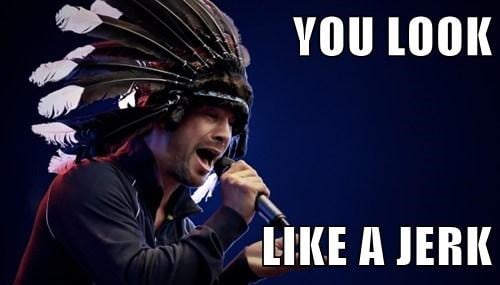 Jamiriquoi, falling into the same trap as so many misguided cultural appropriators before him. (image source)
Jamiriquoi, falling into the same trap as so many misguided cultural appropriators before him. (image source)
Once your band starts to get a little attention, whether on a local, regional or national scale, it can be tempting to start trying to set yourself apart. And the easiest — not to mention probably the most fun — way to do that is to go around offending people, acting a fool or generally being insensitive to people in certain cultural groups. And sure, the shock and awe offensive is a great way to garner attention, however negative it may be. But unlike a bad review, where a writer is at least evaluating a band on the merits of its artistic output, bad behavior and offensive fashion choices alienate prospective fans and industry gatekeepers alike.
I’ve seen this happen most recently with Athens, GA, punk band Muuy Biien — who, I should mention right off the bat, seem to have turned a corner before it was too late. Their transgressions in the early stages of their band’s lifecycle are too numerous to count. There was the time two of the guys rolled around in the mulch at a show at an outdoor venue, making out with each other while another artists tried to play to a distracted crowd. A few months later, they accepted an award at Athens’s annual music award ceremony with a “we don’t give a shit about you people” speech before smashing their trophy on the ground outside the theater and running gleefully off into the night. Confusing nihilism and often just plain nastiness with a punk sensibility, they did damage to relationships both real and potential that a band with lesser chops could never have bounced back from.
Why, then, have bands like The Black Lips been celebrated for similarly antisocial antics? Well, for one thing, they came up in Atlanta, a town with a much more aggressive scene than Athens’s squishy E6 feelies can stomach. The first rule of any creative endeavor is to know your audience.
Knowing your audience comes in especially handy when it’s time to put together marketing materials, like a bio or a band photo. Band photos are perhaps one of the trickiest career choices to navigate, and one of the most rife with opportunities to goof up.
Some months back, one of my publicist friends butted heads with a band over their press photo. The band was pretty good, and their press photos looked nice and professional. There was only one problem. The lead singer was wearing a garish, blue-feathered, faux-Indian headdress in the picture. He looked like a thousand Coachella bro jokes waiting to happen. He looked like a walking thinkpiece about cultural insensitivity. He looked like a bad cliché.
My publicist friend tried, diplomatically, to explain why wearing a costumey Indian headdress was likely to offend people – among them the very people the band was trying to market their music to, which were mostly, media-savvy, liberal young people. But the band stood their ground, insisting that their tasteless cultural appropriation was “a joke” and ironic. How anyone looking at the photo was to discern the irony behind the wardrobe is anyone’s guess. I watched the publicist friend quietly prioritize other projects she was working on instead of the headdress-wearing band.
The band may not have known their audience very well, but their publicist did — and she wasn’t about to compromise her reputation by spending one second more than her contract required promoting a relatively unknown group that stubbornly refused to make good choices about their image.
A few weeks back, I wrote about why high-concept marketing ploys, like Wu-Tang’s scheme behind Once Upon a Time in Shaolin, are not wise for smaller bands. The same is true of emulating The Black Lips’ foolery or any number of big-name artists’ over-the-top style choices: to prospective fans or journalists considering covering your band, it simply looks like you’re compensating for a lack of talent or compelling musical ideas.
In all things, when you’re on the make, the wisest choice is almost always the one that promotes the music without getting in the way. Once your big hat or big personality become the story, you’ve begun to lose the battle for respect and longevity.
In general, here is what most audiences want out of you: Be nice. Be gracious. Act as if your fans spending their time and money on you is something you appreciate. Even if you are in a punk band and part of your identity is a kind of "Fuck the man!" sensibility, a lot of what holds music scenes together is people's sense that they're, you know, in something together. Help make 'em feel that way.


